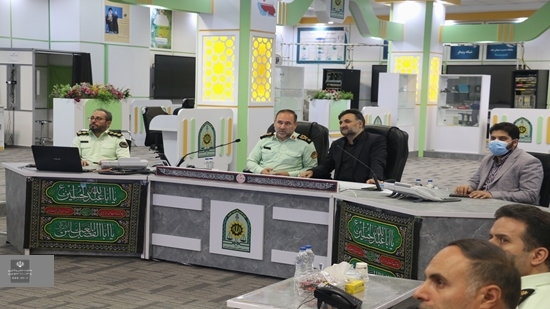The visit of the vice president for science, technology and economy to Arbaeen Faraja camp
The Vice President of Science, Technology and Knowledge-Based Economy appreciated Faraja's effective measures to serve Arbaeen Hosseini pilgrims.

According to the Communication and Information Center in the Vice Presidency of Science, Technology and Knowledge-Based Economy, the Vice President of Science, Technology and Knowledge-Based Economy, today on the eve of Arbaeen Hosseini from the Arbaeen camp, which is in order to provide the best and fastest service to the pilgrims of Karbala. and visited the participants in the huge Arbaeen procession.
During this visit, Sardar Ahmad Dolatkhah, the deputy of Faraja Information and Communication Technology, gave detailed explanations about the services provided by the camp to the visitors and the technologies used in the Arbaeen camp to Ruhollah Dehghani, the vice president of Science, Technology and Knowledge-Based Economy.
According to him, the police of the Islamic Republic of Iran, with the establishment of the Arbaeen base, using the technological infrastructure, provides various services such as in-person and online passport issuance, real-time control of pilgrims' traffic from different land, air and sea borders and road traffic control. Leading to the borders, it provides visitors with traffic control of foreign nationals and preventive measures to maintain security and prevent theft of pilgrims and their cars. Coordination and exchange of information with the Iraqi side is one of the other measures taken through the Arbaeen base.
Among the technological measures that have been carried out in the form of this camp and have led to the facilitation and acceleration of serving Arbaeen pilgrims are the design, implementation and management of a very wide, complex and integrated telecommunications network, connecting to various national databases such as civil registration, registration of documents, Ministry of Interior, Ministry of Communications, etc., development of audio and video processing and transmission technologies in the form of a dedicated police telecommunication operator, online monitoring of information and data at all borders in real-time along with various analytical dashboards and decision support in creation and management of large-scale data exchange and storage in databases in such a way that in less than three or four seconds, all controls are performed at border points and the necessary data is recorded and stored.
Ruhollah Dehghani, Vice President for Science, Technology and Knowledge-based Economy, while appreciating the effective actions of Faraja, called the said operation a great national action and emphasized: Thanks to God, this year our dear pilgrims witnessed that the process of entering and exiting Borders, especially land borders, were established almost immediately. In the past years, this event sometimes took several hours and annoyed the pilgrims, but this year, with the efforts of the Arbaeen camp and Faraja's vice-president of technology and information, this action has taken place.
While appreciating the people involved in the design and implementation of this operation, he said: "During the visit to the program and capabilities of this project, we saw that this operation can be a very good model for all the country's institutions and today is truly a witness." We are a big step towards access to smart police.
Dehghani continued: All borders, routes and roads will be smart. Even drone monitoring of routes, parking lots, passenger traffic, and camera monitoring of officers' clothes is done, and in general, a complete IOT network has been formed with full control and access from all parts of the country.
In the end, the Vice President of Science stated: The good news is that with the planning done, we can see that soon these data will be available to IT-oriented businesses in standard protocols, and based on these data, it will be possible to create Other attractive services are also created by startups and knowledge-based companies.






 adress : No. 209 , between Navab Str and Roudaki Str. Azadi Str. Tehran - Iran
adress : No. 209 , between Navab Str and Roudaki Str. Azadi Str. Tehran - Iran  phone: +98 21 63478000
phone: +98 21 63478000
نظر دهید